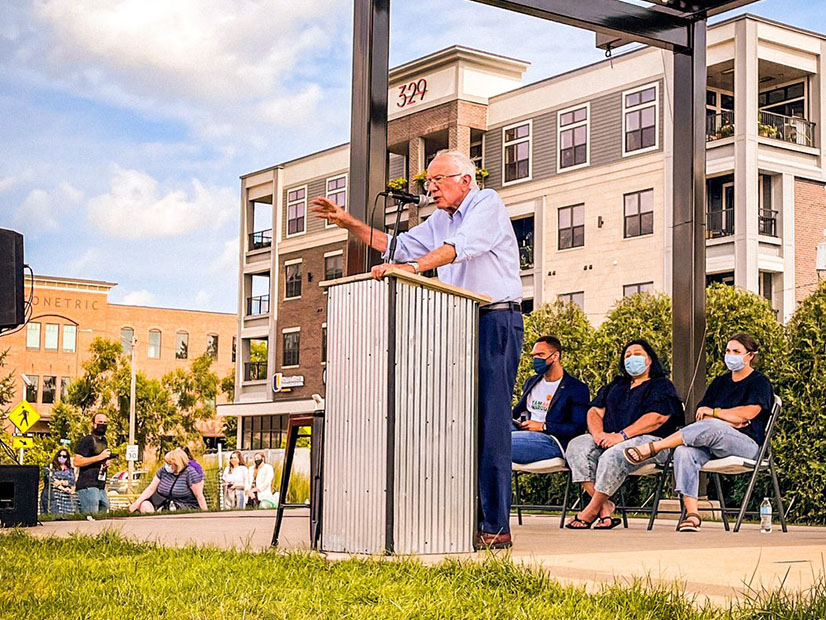
Sen. Bernie Sanders (I-Vt.) assured local energy leaders in Vermont on Wednesday that he is “working night and day” to pass the $3.5 trillion budget reconciliation bill so they have the funding they need to make the state a model for climate initiatives.
“I love the concept of town energy committees,” he said. “This is the kind of grassroots activism that we’re going to need, not only in Vermont, but around this country, to deal with what I think all of us recognize is an existential threat not only to our state and our country, but to the entire planet.”
The bill “will put more by far into addressing climate than any piece of legislation in the history of the country,” he said during a Climate Town Meeting for municipal energy committees hosted by the Vermont Energy and Climate Action Network (VECAN).
The U.S. Senate and House of Representatives have already passed the budget blueprint, and congressional committees are working now on the final bill text. Sanders said he hopes the final bill will be ready by the time Congress returns from its summer break.
The bill, he said, would unlock billions of dollars for energy efficiency, renewable energy and transportation electrification.
Vermont has about 130 volunteer municipal energy committees, according to VECAN. Sanders heard from representatives of the Sunderland, Peacham and Bristol committees during the meeting about what they are doing to help the state meet its emission-reduction goals and the challenges they face.
Sunderland and Peacham have been supporting residents with weatherization programs and subsidies for home energy audits to help reduce energy burden.
While Peacham is having success with its home audits, energy committee member Allison Webster said it’s difficult to incentivize homeowners to follow through with the weatherization recommendations that come from those audits.
Funding in the budget bill, according to Sanders, could help with that.
A weatherization loan, he said, would cover the high upfront costs of energy-saving renovations, and homeowners would pay back the loan at a rate that is no higher than the amount they are saving on their energy bills.
Peacham also has hosted electrification events for residents to learn more about electric vehicles and e-bikes, as well as other electric equipment, such as lawnmowers. Sunderland wants to duplicate that model, according to Jeff Dexter, a member of the town’s energy committee, to show residents that electric cars and equipment help the environment and save money.
While a few Peacham residents own EVs, Webster said the small town does not have any public charging stations.
“We would love to be able to have a public charging station, but unfortunately it’s not something that our town budget can handle,” she said. There are incentive programs for public charging, “but it seems like they’re geared towards larger businesses and not small groups like our nonprofits that might want to host one.”
If the budget bill passes, there will be “billions of dollars coming in to make sure that we can charge EVs and people can travel efficiently,” Sanders said.
In addition, the bill would have significant rebates to help working-class families purchase EVs, he said. The goal, he added, is for buyers to receive the rebates at the point of sale instead of as a tax credit.
The energy committees in Peacham and Bristol currently are developing community solar projects in their jurisdictions.
In Bristol, the committee embarked on a plan to develop a solar array on a shuttered landfill. The committee selected Acorn Energy to develop the 500-kW project, according to committee member Richard Butz, who said 40% of the solar from the facility is guaranteed for residents who cannot install rooftop solar.
But he also expressed concern that a step-down in net-metering rates recently authorized by state regulators is a disincentive to residents who would like to put panels on their homes. Sanders shared Butz’s concern.
“When we are all talking about the need to aggressively move to sustainable energy and we can put solar up on our rooftops, why is the [Public Utilities Commission] making that less attractive for people to do?” Sanders asked. “I don’t understand that myself, and I will talk to the PUC.”
If the federal government were to subsidize the high cost of solar panels, Butz said, it would be a better alternative to the complicated rate incentive structure currently in place. Federal solar loans, like weatherization loans, could be possible with funding from the budget bill, Sanders said.


